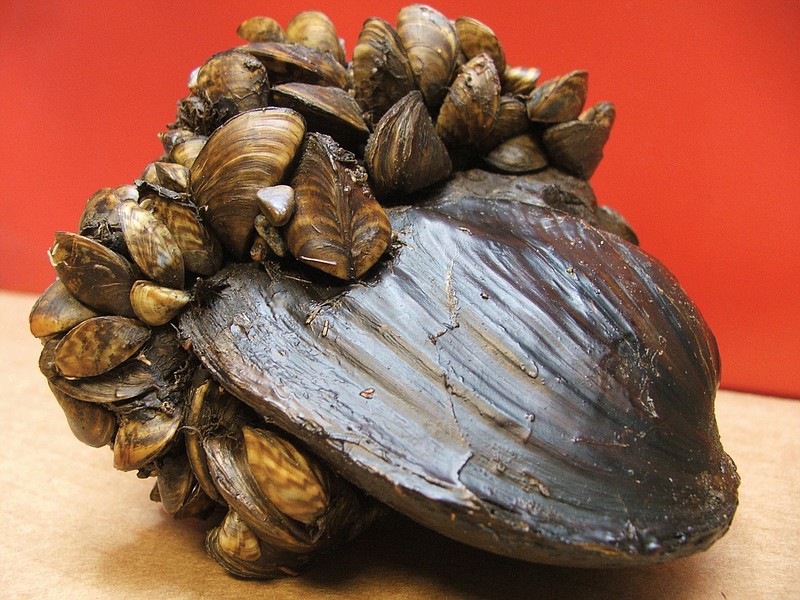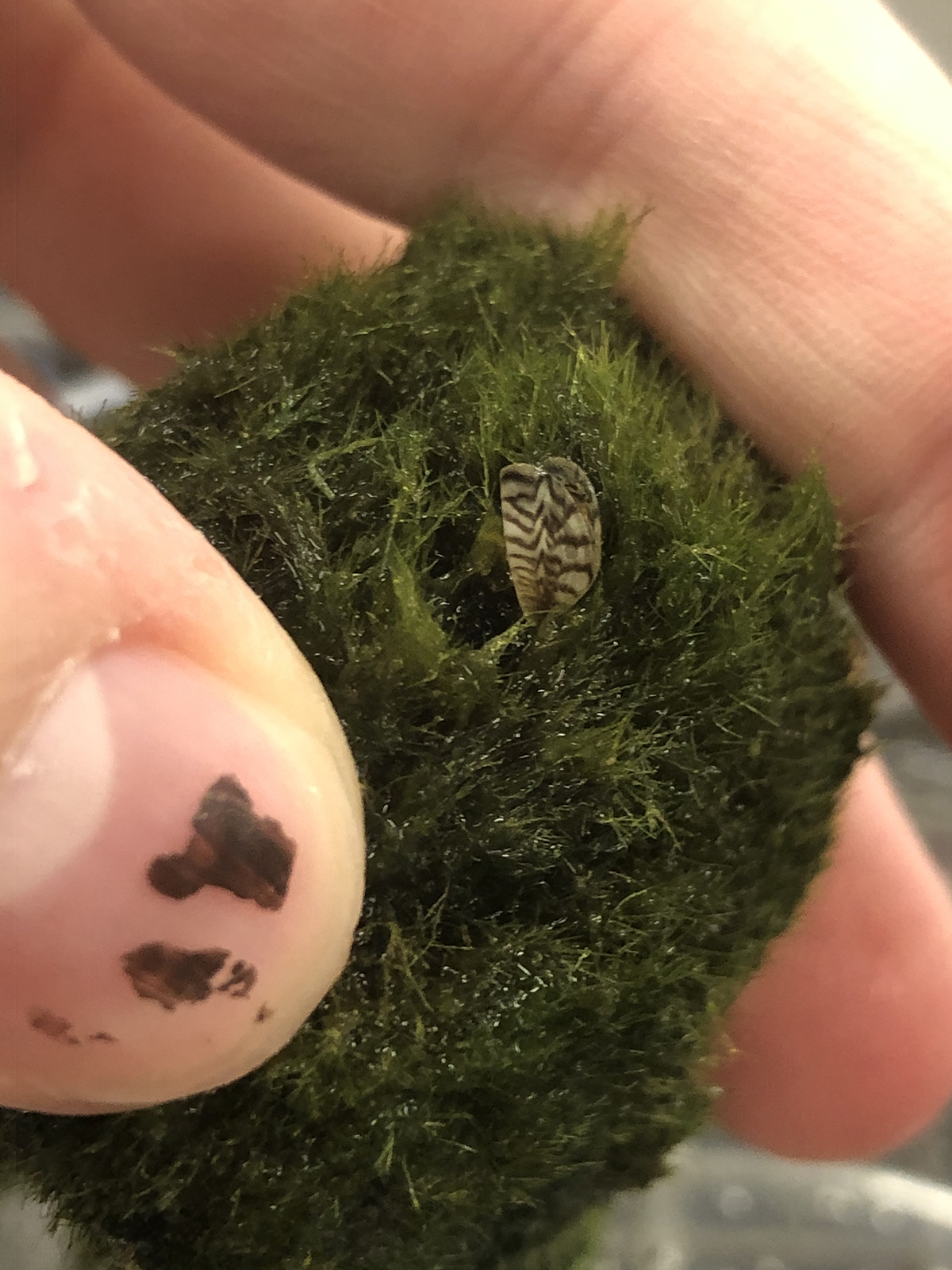State and federal wildlife agencies are warning pet and aquarium store owners and their customers about the finding earlier this month of invasive zebra mussels in aquarium products known as "moss balls."
According to federal officials, reports of zebra mussels in moss balls have come from 21 states, including Tennessee, Georgia, Florida and Virginia in the Southeast. The products, "Betta Buddy Marimo Ball" and similarly described products, were imported and have been distributed nationwide in the U.S, according to state and federal officials.
Most major pet stores have already pulled these products from shelves, officials said. However, consumers should always be cautious about products purchased online. It is illegal in the U.S. to purchase, possess or transport zebra mussels.
On March 6, national chain PetSmart issued a notice to customers stating, "We are voluntarily withdrawing the Marimo aquarium moss balls listed below due to invasive zebra mussels being found within a variety of moss ball products."
Another national chain with stores in Chattanooga, Petco, also warned customers away from the products and said they were working with wildlife officials.
"We were approached by the Washington Department of Fish and Wildlife regarding an investigation into a potential link between Marimo aquarium moss balls and wild zebra mussels," Petco officials said in an email to the Times Free Press on Friday.
"To aid in the investigation and prevent potential spread, we immediately paused the sale of all Marimo aquarium moss balls at Petco locations and on petco.com, and placed them in quarantine," officials said. "We are working closely with regulatory authorities, our vendor partners and our own veterinary staff on appropriate next steps, including proper handling and disposal of any affected product and proactively contacting our customers to provide information and resources on how to responsibly collect and dispose of them at home, if necessary."
In Chattanooga, Bermuda Triangle Tropical Fish store employee Cody Carpenter said those products aren't stocked but they seem to be in demand.
"We don't keep them," Carpenter said. "I'm kind of glad because everybody's been asking for them and luckily we just haven't had them."
Ethan Dickinson, owner of Fish Mania aquarium store in East Ridge, said moss balls have been a popular aquarium product for a long time and he had them in stock.
After examining the moss balls under a microscope to determine they were free of zebra mussels and eggs, Dickinson said the balls were removed from the store tank, the tank was properly drained and disinfected and he took the removed moss balls home to his own aquarium where the algae could live out its life.
Dickinson said moss balls are a popular staple in the hobby that are often put in tanks as a living decoration.
"It's a ball of algae that just grows. It's the easiest thing to grow in a tank. You could put it in a bowl of water and it would still live," he said.
People have become accustomed to putting moss balls in their tanks, particularly for beta fish, but also simply as a living piece of greenery for fish tank habitat.
DESTROY, DON’T DUMP
If you recently purchased “moss balls” or similar aquarium products, don’t just throw them away or pour them down the drain where they can make their way into local waters. Moss balls must be destroyed and disposed of in a sealed container in the trash.If moss balls have already been introduced into an aquarium, destroy them by one of these methods:Freeze: Place the moss ball into a sealable plastic bag and freeze for at least 24 hoursBoil: Place the moss ball in boiling water for at least 1 full minuteBleach/Vinegar: Submerge the moss ball in chlorine bleach or undiluted white vinegar for 20 minutesDispose of the moss ball and any of its packaging in a sealed plastic bag in the trash. If vinegar, boiling water, or bleach was used, the liquid can be disposed down a household drain but never down a storm drain where it could enter and damage local waterways. Lastly, drain and clean the aquarium. More detailed instructions can be found here.REPORT INVASIVE SPECIESTo report a suspected sighting of a zebra mussel or another non-indigenous aquatic plant or animal, go to bit.ly/invasivez.Source: U.S. Fish and Wildlife Service
Atlanta aquarium wholesaler Sun Pet, which sells to stores in the area, posted a notice on the company's social media page March 8 warning of the zebra mussel discovery.
"As a steward for the environment and the aquarium hobby, it is imperative we all take action to educate and eliminate the potential spread of this invasive species," the company said in a post that included links to directions on what to do with moss balls.
"If you find that you need to disinfect your aquarium, we highly encourage you to reach out to your local pet store for additional guidance," Sun Pet officials said.
Aquarium owners who have purchased and used moss balls should follow disposal and disinfection guidelines described by the U.S. Fish and Wildlife Service at bit.ly/zmussel.
Federal guidance suggests freezing the products in a plastic bag for 24 hours or boiling the products for at least one minute and discarding in the trash, officials said. Aquariums that have had the products in them also must be thoroughly disinfected with similar but somewhat more complicated methods and on a larger scale for longer periods.
The problem comes when water containing the products is dumped out, officials said.
"Aquarium owners should never dump an aquarium into a body of water or into drains that may lead to local waters," Tennessee Wildlife Resources Agency aquatic nuisance species coordinator Cole Harty said in a statement on the problem. "This situation shows how easily an invasive species could be introduced by someone improperly disposing of their aquarium contents."
Zebra mussels can have serious negative impacts on aquatic resources, according to wildlife officials. They foul industrial water intakes, suffocate native mussels, use resources needed by native species, damage recreational equipment, and their sharp shells can injure swimmers.
Although zebra mussels are already present in numerous bodies of water in Tennessee, including the Tennessee and Cumberland rivers, state officials said actions should be taken to prevent further spread of these invasive mussels in Tennessee and beyond. In addition to proper disposal and disinfection of fish tanks, boaters and other resource users should take steps to clean, drain, and dry equipment between outings, officials said.
In 1990, in response to the first wave of zebra mussel invasions, the U.S. Geological Survey set up its Nonindigenous Aquatic Species Database, which tracks sightings of about 1,270 non-native aquatic plants and animals nationwide, including zebra mussels, federal officials said. Wildlife managers at the state and local level use the database to find and eliminate or control potentially harmful species.
Federal officials said the coordinator of the database, U.S. Geological Survey fisheries biologist Wesley Daniel, learned about the presence of zebra mussels in moss balls on March 2 and alerted others nationwide about the issue. Moss balls are ornamental plants imported from Ukraine that are often added to aquariums.
"The issue is that somebody who purchased the moss ball and then disposed of them could end up introducing zebra mussels into an environment where they weren't present before," Daniel said. "We've been working with many agencies on boat inspections and gear inspections, but this was not a pathway we'd been aware of until now."
According to fish and wildlife officials, the U.S. Department of Agriculture, several state wildlife agencies and an industry group, the Pet Industry Joint Advisory Council, are also taking steps to mitigate the problem. National alerts have gone out.
Beside three states in the Southeast, reports of zebra mussels in moss balls have come from Alaska, California, Colorado, Iowa, Massachusetts, Michigan, Montana, Nebraska, Nevada, New Mexico, North Dakota, Oklahoma, Oregon, Vermont, Wisconsin, Washington and Wyoming, officials said.
"I think this was a great test of the rapid-response network that we have been building," Daniel said. "In two days, we had a coordinated state, federal and industry response."
Federal agencies are also studying potential methods to help control zebra mussels that are already established in the environment, such as low-dose copper applications, carbon dioxide and microparticle delivery of toxins, officials said.
The problem isn't lost on store owners.
"Tennessee is the most aquatic-diverse state in the U.S.," Dickinson said, "and a mussel that is predatory is not great for all these little springs with all these little fish that don't have very large populations."
The native species that peacefully coexist in Tennessee's waters are vulnerable to invasive species such as zebra mussels that can take up resources that indigenous animals need to live, and that's reason for concern, he said.
"If one pest gets into their water system, or that spring or that creek, that could spell doom for an entire species," he said.
Contact Ben Benton at bbenton@timesfreepress.com or 423-757-6569. Follow him on Twitter @BenBenton or at www.facebook.com/benbenton1.

